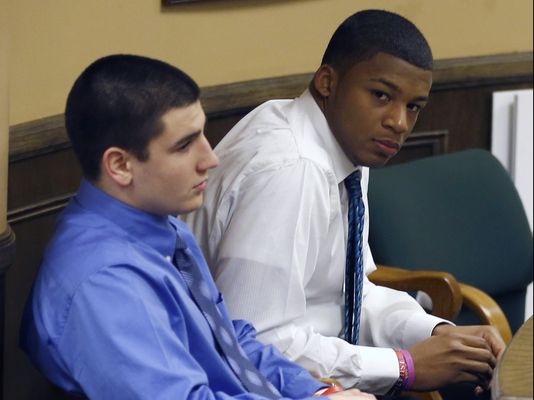AS MORE AND MORE is reported about Steubenville, I find myself recoiling at the rising tide of ugliness swallowing the case. There has been an onslaught of sublimated anger, name-calling, judgment and abuse not only of the victim but also of her predators, bystanders, coaches, the people of Steubenville, and a society which elevates young athletes above the culture producing them.
In a fine essay published earlier this week at The Good Men Project, blogger HeatherN makes a controversial but logical point:
My immediate reaction to the knowledge that we dehumanize rapists is, “so what?” [Writer’s note: Me too.] … rapists deserve to be imprisoned; I’d argue for a lot longer than current sentencing allows in most states. But still, treating rapists as non-human because they are criminals only contributes to a culture which treats all its criminals as subhuman.
Conversely, elevating these young men to god-like status removes them from the lowly earth where humans dwell with all their evil, fallibility, selfishness and even the goodness in which Anne Frank chose to believe. The objectification of both criminal and victim is detrimental to all of us.
With 38% of yearly reported rapes perpetrated by a friend or acquaintance of the victim, 28% by an “intimate” and another 7% by a relative, we must be very careful not to put the young men who raped Jane Doe at a distance. In our culture, we prefer that someone who commits a monstrous crime look like a monster … but he doesn’t. He looks and behaves like you and me, and it is a mistake to interpret the acknowledgment of a criminal’s humanity as sympathy. Trent Mays and Ma’lik Richmond were (and are) members of a community where they were known, perhaps even liked. They behaved like monsters. They did a series of monstrous things. But if we forget that they are human beings, we forget that human beings are capable of great wrong.
Rape victims are objectified by the rapist – dehumanized. In the United States, which is ranked sixth worldwide in reported rapes (approximately 27 victims in every 100,000 women) there is an estimated 60% which go unreported partly because of what the victim must face if she comes forward. Police, leadership, communities, and families blame the victim, denying that “young men with promising futures” can rape. The criminal becomes a symbol of goodness, and the victim, a vengeful harpy; but when the rapist is also dehumanized, his responsibility is obliterated. At the same time, denying that a criminal is a human being absolves the society of responsibility for his development and rehabilitation. We either lock criminals up forever, essentially putting them to death, or we make it possible for them to re-enter society. Revenge serves no justice if we want someone to take responsibility. If we believe the criminal is a monster, why not execute him? No amount of time in prison can teach a monster remorse, and we certainly don’t want monsters among us.
Without a thorough psychological examination, it’s impossible to know if either Mays or Richmond is a sociopath. (Mays’ wretched apology makes me wonder, but I am not a psychologist.) The storm of violence this situation has become makes me question the sanity of our society too. The elevation of sports figures beyond their station – once again dehumanizing them – sets these young men apart from society. Does hubris lead to rape? I would like to say “no,” but I think the answer is more like “sometimes.” Hubris, a very human flaw, can be pointed to as can a disturbed psychology. Hubris, though, is compounded by outside reinforcement.
On Monday, March 18, two teenage girls who texted threats to the victim were (mercifully) arrested. “You ripped my family apart,” the first girl tweeted, “You made my cousin cry, so when I see you [expletive] it’s gone [sic] be a homicide.” She is 16 years old and was arrested for threatening the victim’s life. The second girl, age 15, was also “charged with threatening the girl with bodily harm” (according to a story on HLN) after her tweet, which read, “I’ll celebrate by beating the [expletive] out of Jane Doe.”
I want these young women to be punished as severely as the rapists because of their complicity and denial. I feel the same way about those who have threatened Michael Nodianos and his family. Nodianos is the young man in the video posted and shared by Anonymous (and/or Knight Sec), which depicts him treating the crime as a joke. Nodianos was not charged with any crime and was not present when the victim was raped. Nevertheless, because of his ignorance, heartlessness, and lack of empathy, Nodianos’ family, like the families of the rapists, has been objectified and harassed by violent threats. We know nothing of his upbringing, nothing of his family, yet they are blamed for his wretchedness. We can theorize about how he came to this point but we do not really know. Childhood development is not a math equation, and Michael Nodianos’ mother is not a cipher.
When I read a comment thread under an article, video, or online op-ed, I’m frequently aghast at what people say to each other. Today’s youth learn this is acceptable because it is not only our youth who behave this way. It is a cultural phenomenon. Hidden behind the anonymity of the laptop, anyone can say anything from home and disappear. It’s easy to lob grenades of hate through the ether and then walk away. In my essay for The Weeklings last year, “When Cthulu Calls,” I examined this phenomenon from a comic perspective. But here is its serious side: dehumanizing is a societal illness. Mr. Nodianos is having his eyes opened by the daggers which have come his way. He has been made a “thing” in the eyes of onlookers, just as he failed Jane Doe by laughing about her plight in that video. Just as Trent Mays and Ma’lik Richmond dehumanized her.
As one of approximately 89,000 yearly victims of reported rapes in the United States, Jane Doe deserves justice, sympathy and, perhaps most of all, privacy to recover from her public ordeal – though “recover” seems a foolish word in the vast wake of post-traumatic symptoms she is likely to experience: abrupt changes in mood, acute distress, alcohol or drug abuse, anger, anxiety, confusion, crying, depression, disbelief, eating disturbances, embarrassment, emotional disorganization, fatigue, fear, graphic flashbacks , headaches, insomnia, irritation, lack of appetite, nausea, self-blame, shock, sleep disturbances, suicidal ideation. Jane Doe does not want to be our symbol any more than she wanted to be a victim. She is a budding young woman who made a few teenage mistakes – mistakes we have all made – none of which are an excuse for the violence her attackers committed.
When CNN stepped into the fray, reigniting anger about the case and, justifiably, about America’s attitude toward rape, I was ready to point a finger again at Poppy Harlow and even more at Candy Crowley whose work I respect. Then I actually watched the video. Pity subsumed journalistic integrity all around. Our anger stems from the fact that no one in the segment portrayed the young men as monsters, which would have satisfied our bloodlust but would not have been entirely accurate either.
I have little sympathy for people who knowingly commit crime – and none for someone who commits an act of violence. Mays and Richmond will never be able to shake the mantle of “registered sex offender.” They have been taken down from the pedestals they were set upon by their community and by a nation which loves to idolize. I’m not concerned about their “bright futures” being ruined, but I do admit to a sort of contemptuous pity, the kind of head-shaking I reserve for someone who has done something foul from which he cannot be saved. Whether or not Mays and Richmond were misled by their community and our society, they alone are responsible for their choices. The greatest punishment they can know – the one that will benefit us, their victim and the people of Steubenville – is that they live with the absolute understanding of what they did to that young woman. They can only atone by re-entering the world with the understanding most of us never have to learn the hard way: in a worthwhile society, humans honor the capacity for both compassion and respect.
Monsters have an excuse. It is only a human being who can take responsibility for his action.





Such a complex issue. There are no winners here. I think we need to regain/teach/celebrate a basic respect for human life and well being. I agree that neither rationalizing nor dehumanizing solves the problem. We should all grieve what happened in Steubenville and at Penn State and wherever else sports blur the line between appropriate and criminal behavior and then take whatever steps are necessary to prevent it from happening again.
“Grieve” is the right word, Laurie. Thank you for reading and sharing your thoughts on this difficult subject.
Such an astute observation, Laurie. The understanding of human dignity is sacrificed in the crimes we commit against each other. In the most violent of these crimes, there is often a component missing in the perpetrator. The question of nature or nurture has been debated for a long time. One cannot teach a psychopath (or a sociopath) the value of empathy but we can reach the rest of the population.
Just letting you know that you’re hyperlink is missing a : after the http, so it’s broken. :)
I also totally agree with your article, though my anger at the CNN clip isn’t quite as simple as wanting them to portray the young men as monsters. Rather it’s twofold…with limited time and resources, they spent time talking about the rapists instead of the survivor. Part of that is understandable, as the survivor’s identity was meant to be kept secret…but still, it’s troubling.
The other problem is that I don’t think what CNN did actually is humanizing. I think that was their goal, but I think what they ended up doing is infantilizing…failing to acknowledge that part of what makes us human is our ability to make decisions and accept the consequences of those decisions. So, like, Mays life wasn’t ruined by these events…Mays ruined his own life by causing these events. A small grammatical difference, but really it makes all the difference in the world.
Heather – Thanks for articulating more precisely what troubled me about the CNN coverage. The attempt to give the story an angle was a botched affair – troubling because it feeds into community anger over “rape culture,” and because Crowley and Harlow seemed to negate consequences for victim by omitting her from the story.
Your precision is a lesson. Thanks for reading. (And for checking that link!) It’s been fixed.
Well I couldn’t very well see a link to my thing without clicking on it. Oh, the need for a writer to be validated! lol.
And yeah, needing to give the story an angle was totally botched…and needing to give it an angle at all was kind of part of the problem, I think. Our media needs to place stories into a larger narrative (gun violence, terrorism, whatever)…and needs to make sure they have “an angle” on the story. They couldn’t have just reported on the trial factually…they needed to express opinions about it. So then this need to have an opinion-based news story opened the door for people to say things which perpetuated rape culture.
I’m a big fan of “just the facts, ma’am,” to quote DRAGNET. I’d rather just have the facts and make my own decisions but the 24-hour news cycle has severely impacted our media.
Pingback: On Rape and the Culture of Monsters — The Good Men Project